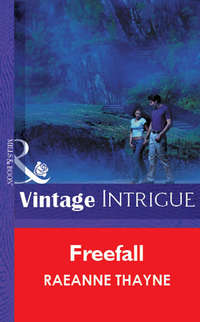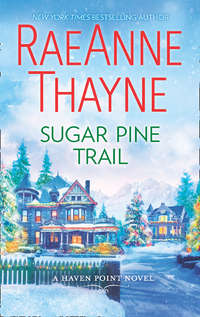
Полная версия
A Cold Creek Reunion


Laura.
He froze and, for the first time in fifteen years as a firefighter, he forgot about the incident, his mission, just what the hell he was doing here.
Laura.
Ten years. He hadn’t seen her in all that time, since the week before their wedding when she had given him back his ring and left town. Not just town. She had left the whole damn country, as if she couldn’t run far enough to get away from him.
Some part of him desperately wanted to think he had made some kind of mistake. It couldn’t be her. That was just some other slender woman with a long sweep of honey-blond hair and big blue unforgettable eyes. But no, it was definitely Laura, standing next to her mother. Sweet and lovely.
Not his.
Dear Reader,
I’ve read romance novels almost as long as I can remember. I think I picked up my first Mills & Boon when I was about eleven and I instantly fell in love. I still love that thrill in my heart as I read about two people who deserve to find happiness together!
As I grew older, I discovered a whole new world of books out there and many fantastic authors whose stories have enriched my life more than I can say.
Once in a while, I still have to pinch myself when I realize I’m actually writing for the line that has given me so many wonderful hours of reading enjoyment over the years.
RaeAnne Thayne
About the Author
RAEANNE THAYNE finds inspiration in the beautiful northern Utah mountains, where she lives with her husband and three children. Her books have won numerous honors, including RITA® Award nominations from Romance Writers of America and a Career Achievement Award from RT Book Reviews. RaeAnne loves to hear from readers and can be contacted through her website, www.raeannethayne.com.
A Cold Creek
Reunion
RaeAnne Thayne

www.millsandboon.co.uk
To romance readers who, like me,
love happily ever afters.
Chapter One
He loved these guys like his own brothers, but sometimes Taft Bowman wanted to take a fire hose to his whole blasted volunteer fire department.
This was their second swift-water rescue training in a month—not to mention that he had been holding these regularly since he became battalion chief five years earlier—and they still struggled to toss a throw bag anywhere close to one of the three “victims” floating down Cold Creek in wet suits and helmets.
“You’ve got to keep in mind the flow of the water and toss it downstream enough that they ride the current to the rope,” he instructed for about the six-hundredth time. One by one, the floaters—in reality, other volunteer firefighters on his thirty-person crew—stopped at the catch line strung across the creek and began working their way hand over hand to the bank.
Fortunately, even though the waters were plenty frigid this time of year, they were about a month away from the real intensity of spring runoff, which was why he was training his firefighters for water rescues now.
With its twists and turns and spectacular surroundings on the west slope of the Tetons, Cold Creek had started gaining popularity with kayakers. He enjoyed floating the river himself. But between the sometimes-inexperienced outdoor-fun seekers and the occasional Pine Gulch citizen who strayed too close to the edge of the fast-moving water, his department was called out on at least a handful of rescues each season and he wanted them to be ready.
“Okay, let’s try it one more time. Terry, Charlie, Bates, you three take turns with the throw bag. Luke, Cody, Tom, stagger your jumps by about five minutes this time around to give us enough time on this end to rescue whoever is ahead of you.”
He set the team in position and watched upstream as Luke Orosco, his second in command, took a running leap into the water, angling his body feetfirst into the current. “Okay, Terry. He’s coming. Are you ready? Time it just right. One, two, three. Now!”
This time, the rope sailed into the water just downstream of the diver and Taft grinned. “That’s it, that’s it. Perfect. Now instruct him to attach the rope.”
For once, the rescue went smoothly. He was watching for Cody Shepherd to jump in when the radio clipped to his belt suddenly crackled with static.
“Chief Bowman, copy.”
The dispatcher sounded unusually flustered and Taft’s instincts borne of fifteen years of firefighting and paramedic work instantly kicked in. “Yeah, I copy. What’s up, Kelly?”
“I’ve got a report of a small structure fire at the inn, three hundred twenty Cold Creek Road.”
He stared as the second rescue went off without a hitch. “Come again?” he couldn’t help asking, adrenaline pulsing through him. Structure fires were a rarity in the quiet town of Pine Gulch. Really a rarity. The last time had been a creosote chimney fire four months ago that a single ladder-truck unit had put out in about five minutes.
“Yes, sir. The hotel is evacuating at this time.”
He muttered an oath. Half his crew was currently in wet suits, but at least they were only a few hundred yards away from the station house, with the engines and the turnout gear.
“Shut it down,” he roared through his megaphone. “We’ve got a structure fire at the Cold Creek Inn. Grab your gear. This is not a drill.”
To their credit, his crew immediately caught the gravity of the situation. The last floater was quickly grabbed out of the water and everybody else rushed to the new fire station the town had finally voted to bond for two years earlier.
Less than four minutes later—still too long in his book but not bad for volunteers—he had a full crew headed toward the Cold Creek Inn on a ladder truck and more trained volunteers pouring in to hurriedly don their turnout gear.
The inn, a rambling wood structure with two single-story wings leading off a main two-story building, was on the edge of Pine Gulch’s small downtown, about a mile away from the station. He quickly assessed the situation as they approached. He couldn’t see flames yet, but he did see a thin plume of black smoke coming from a window on the far end of the building’s east wing.
He noted a few guests milling around on the lawn and had just an instant to feel a pang of sympathy for the owner. Poor Mrs. Pendleton had enough trouble finding guests for her gracefully historic but undeniably run-down inn.
A fire and forced evacuation probably wouldn’t do much to increase the appeal of the place.
“Luke, you take Pete and make sure everybody’s out. Shep, come with me for the assessment. You all know the drill.”
He and Cody Shepherd, a young guy in the last stages of his fire and paramedic training, headed into the door closest to where he had seen the smoke.
Somebody had already been in here with a fire extinguisher, he saw. The fire was mostly out but the charred curtains were still smoking, sending out that inky-black plume.
The room looked to be under renovation. It didn’t have a bed and the carpet had been pulled up. Everything was wet and he realized the ancient sprinkler system must have come on and finished the job the fire extinguisher had started.
“Is that it?” Shep asked with a disgruntled look.
“Sorry, should have let you have the honors.” He held the fire extinguisher out to the trainee. “Want a turn?”
Shep snorted but grabbed the fire extinguisher and sprayed another layer of completely unnecessary foam on the curtains.
“Not much excitement—but at least nobody was hurt. It’s a wonder this place didn’t go up years ago. We’ll have to get the curtains out of here and have Engine Twenty come inside and check for hot spots.”
He called in over his radio that the fire had been contained to one room and ordered in the team whose specialty was making sure the flames hadn’t traveled inside the walls to silently spread to other rooms.
When he walked back outside, Luke headed over to him. “Not much going on, huh? Guess some of us should have stayed in the water.”
“We’ll do more swift-water work next week during training,” he said. “Everybody else but Engine Twenty can go back to the station.”
As he spoke to Luke, he spotted Jan Pendleton standing some distance away from the building. Even from here, he could see the distress on her plump, wrinkled features. She was holding a little dark-haired girl in her arms, probably a traumatized guest. Poor thing.
A younger woman stood beside her and from this distance he had only a strange impression, as if she was somehow standing on an island of calm amid the chaos of the scene, the flashing lights of the emergency vehicles, shouts between his crew members, the excited buzz of the crowd.
And then the woman turned and he just about tripped over a snaking fire hose somebody shouldn’t have left there.
Laura.
He froze and for the first time in fifteen years as a firefighter, he forgot about the incident, his mission, just what the hell he was doing here.
Laura.
Ten years. He hadn’t seen her in all that time, since the week before their wedding when she had given him back his ring and left town. Not just town. She had left the whole damn country, as if she couldn’t run far enough to get away from him.
Some part of him desperately wanted to think he had made some kind of mistake. It couldn’t be her. That was just some other slender woman with a long sweep of honey-blond hair and big blue, unforgettable eyes. But no, it was definitely Laura, standing next to her mother. Sweet and lovely.
Not his.
“Chief, we’re not finding any hot spots.” Luke approached him. Just like somebody turned back up the volume on his flat-screen, he jerked away from memories of pain and loss and aching regret.
“You’re certain?”
“So far. The sprinkler system took a while to kick in and somebody with a fire extinguisher took care of the rest. Tom and Nate are still checking the integrity of the internal walls.”
“Good. That’s good. Excellent work.”
His assistant chief gave him a wary look. “You okay, Chief? You look upset.”
He huffed out a breath. “It’s a fire, Luke. It could have been potentially disastrous. With the ancient wiring in this old building, it’s a wonder the whole thing didn’t go up.”
“I was thinking the same thing,” Luke said.
He was going to have to go over there and talk to Mrs. Pendleton—and by default, Laura. He didn’t want to. He wanted to stand here and pretend he hadn’t seen her. But he was the fire chief. He couldn’t hide out just because he had a painful history with the daughter of the property owner.
Sometimes he hated his job.
He made his way toward the women, grimly aware of his heart pounding in his chest as if he had been the one diving into Cold Creek for training.
Laura stiffened as he approached but she didn’t meet his gaze. Her mother looked at him out of wide, frightened eyes and her arms tightened around the girl in her arms.
Despite everything, his most important job was calming her fears. “Mrs. Pendleton, you’ll be happy to know the fire is under control.”
“Of course it’s under control.” Laura finally faced him, her lovely features cool and impassive. “It was under control before your trucks ever showed up—ten minutes after we called the fire in, by the way.”
Despite all the things he might have wanted to say to her, he had to first bristle at any implication that their response time might be less than adequate. “Seven, by my calculations. Would have been half that except we were in the middle of water rescue training when the call from dispatch came in.”
“I guess you would have been ready, then, if any of our guests had decided to jump into Cold Creek to avoid the flames.”
Funny, he didn’t remember her being this tart when they had been engaged. He remembered sweetness and joy and light. Until he had destroyed all that.
“Chief Bowman, when will we be able to allow our guests to return to their rooms?” Jan Pendleton spoke up, her voice wobbling a little. The little girl in her arms—who shared Laura’s eye color, he realized now, along with the distinctive features of someone born with Down syndrome—patted her cheek.
“Gram, don’t cry.”
Jan visibly collected herself and gave the girl a tired smile.
“They can return to get their belongings as long as they’re not staying in the rooms adjacent to where the fire started. I’ll have my guys stick around about an hour or so to keep an eye on some hot spots.” He paused, wishing he didn’t have to be the bearer of this particular bad news. “I’m going to leave the final decision up to you about your guests staying here overnight, but to be honest, I’m not sure it’s completely safe for guests to stay here tonight. No matter how careful we are, sometimes embers can flare up again hours later.”
“We have a dozen guests right now.” Laura looked at him directly and he was almost sure he saw a hint of hostility there. Annoyance crawled under his skin. She dumped him, a week before their wedding. If anybody here had the right to be hostile, he ought to be the first one in line. “What are we supposed to do with them?”
Their past didn’t matter right now, not when people in his town needed his help. “We can talk to the Red Cross about setting up a shelter, or we can check with some of the other lodgings in town, maybe the Cavazos’ guest cabins, and see if they might have room to take a few.”
Mrs. Pendleton closed her eyes. “This is a disaster.”
“But a fixable one, Mom. We’ll figure something out.” She squeezed her mother’s arm.
“Any idea what might have started the fire?” He had to ask.
Laura frowned and something that looked oddly like guilt shifted across her lovely features. “Not the what exactly, but most likely the who.”
“Oh?”
“Alexandro Santiago. Come here, young man.”
He followed her gaze and for the first time, he noticed a young dark-haired boy of about six or seven sitting on the curb, watching the activity at the scene with a sort of avid fascination in his huge dark brown eyes. The boy didn’t have her blond, blue-eyed coloring, but he shared her wide, mobile mouth, slender nose and high cheekbones, and was undoubtedly her child.
The kid didn’t budge from the curb for a long, drawn-out moment, but he finally rose slowly to his feet and headed toward them as if he were on his way to bury his dog in the backyard.
“Alex, tell the fireman what started the fire.”
The boy shifted his stance, avoiding the gazes of both his mother and Taft. “Do I have to?”
“Yes,” Laura said sternly.
The kid fidgeted a little more and finally sighed. “Okay. I found a lighter in one of the empty rooms. The ones being fixed up.” He spoke with a very slight, barely discernible accent. “I never saw one before and I only wanted to see how it worked. I didn’t mean to start a fire, es la verdad. But the curtains caught fire and I yelled and then mi madre came in with the fire extinguisher.”
Under other circumstances he might have been amused at the no-nonsense way the kid told the story and how he manipulated events to make it seem as if everything had just sort of happened without any direct involvement on his part.
But this could have been a potentially serious situation, a crumbling old fire hazard like the inn.
He hated to come off hard-nosed and mean, but he had to make the kid understand the gravity. Education was a huge part of his job and a responsibility he took very seriously. “That was a very dangerous thing to do. People could have been seriously hurt. If your mother hadn’t been able to get to the room fast enough with the fire extinguisher, the flames could have spread from room to room and burned down the whole hotel and everything in it.”
To his credit, the boy met his gaze. Embarrassment and shame warred on his features. “I know. It was stupid. I’m really, really sorry.”
“The worst part of it is, I have told you again and again not to play with matches or lighters or anything else that can cause a fire. We’ve talked about the dangers.” Laura glowered at her son, who squirmed.
“I just wanted to see how it worked,” he said, his voice small.
“You won’t do it again, will you?” Taft said.
“Never. Never, ever.”
“Good, because we’re pretty strict about this kind of thing around here. Next time you’ll have to go to jail.”
The boy gave him a wide-eyed look, but then sighed with relief when he noticed Taft’s half grin. “I won’t do it again, I swear. Pinky promise.”
“Excellent.”
“Hey, Chief,” Lee Randall called from the engine. “We’re having a little trouble with the hose retractor again. Can you give us a hand?”
“Yeah. Be there in a sec,” he called back, grateful for any excuse to escape the awkwardness of seeing her again.
“Excuse me, won’t you?” he said to the Pendleton women and the children.
“Of course.” Jan Pendleton gave him an earnest look. “Please tell your firefighters how very much we appreciate them, don’t we, Laura?”
“Absolutely,” she answered with a dutiful tone, but he noticed she pointedly avoided meeting his gaze.
“Bye, Chief.” The darling little girl in Jan’s arm gave him a generous smile. Oh, she was a charmer, he thought.
“See you later.”
The girl beamed at him and waved as he headed away, feeling as if somebody had wrapped a fire hose around his neck for the past ten minutes.
She was here. Really here. Blue eyes, cute kids and all.
Laura Pendleton, Santiago now. He had loved her with every bit of his young heart and she had walked away from him without a second glance.
Now she was here and he had no way to avoid her, not living in a small town like Pine Gulch that had only one grocery store, a couple of gas stations and a fire station only a few blocks from her family’s hotel.
He was swamped with memories suddenly, memories he didn’t want and didn’t know what to do with.
She was back. And here he had been thinking lately how lucky he was to be fire chief of a small town with only six thousand people that rarely saw any disasters.
Taft Bowman.
Laura watched him head back into the action—which, really, wasn’t much action at all, given that the fire had been extinguished before any of them arrived. He paused here and there in the parking lot to talk to his crew, snap out orders, adjust some kind of mechanical thing on the sleek red fire truck.
Seeing him in action was nothing new. When they had been dating, she sometimes went on ride-alongs, mostly because she couldn’t bear to be separated from him. She remembered now how Taft had always seemed comfortable and in control of any situation, whether responding to a medical emergency or dealing with a grass fire.
Apparently that hadn’t changed in the decade since she had seen him. He also still had that very sexy, lean-hipped walk, even under the layers of turnout gear. She watched him for just a moment, then forced herself to look away. This little tingle of remembered desire inside her was wrong on so many levels, completely twisted and messed up.
After all these years and all the pain, all those shards of crushed dreams she finally had to sweep up and throw away, how could he still have the power to affect her at all? She should be cool and impervious to him, completely untouched.
When she finally made the decision to come home after Javier’s death, she had known she would inevitably run into Taft. Pine Gulch was a small town after all. No matter how much a person might wish to, it was generally tough to avoid someone forever.
When she thought about it—and she would be lying to herself if she said she hadn’t thought about it—she had foolishly imagined she could greet him with only a polite smile and a Nice to see you again, remaining completely impervious to the man.
Their shared history was a long time ago. Another lifetime, it seemed. She had made the only possible choice back then and had completely moved on with her life, had married someone else, given birth to two children and put Pine Gulch far in her past.
As much as she had loved him once, Taft was really just a small chapter in her life. Or so she told herself anyway. She had been naively certain she had dealt with the hurt and betrayal and the deep sense of loss long ago.
Maybe she should have put a little more energy and effort into making certain of all that before she packed up her children and moved thousands of miles from the only home they had ever known.
If she’d had a little energy to spare, she might have given it more thought, but the past six months seemed like a whirlwind, first trying to deal with Javier’s estate and the vast debts he had left behind, then that desperate scramble to juggle her dwindling bank account and two hungry children in expensive Madrid, and finally the grim realization that she couldn’t do it by herself and had no choice but to move her little family across the world and back to her mother.
She had been focused on survival, on doing what she thought was right for her children. She supposed she really hadn’t wanted to face the reality that moving back also meant dealing with Taft again—until it smacked her upside the head, thanks to her rascal of a son and his predilection for finding trouble wherever he could.
“What are we going to do?” Her mother fretted beside her. She set Maya down on the concrete side walk, and the girl immediately scampered beside Alex and stood holding her brother’s hand while they watched the firefighters now cleaning up the scene and driving away. “This is going to ruin us!”
Laura put an arm around her mother’s plump shoulders, guilt slicing through her. She should have been watching her son more carefully; she certainly knew better than to give him any free rein. She had allowed herself to become distracted checking in some guests—the young married couple on spring break from graduate school in Washington who had found more excitement than they had probably anticipated when their hotel caught fire before they had even seen their room.
While she was busy with them, Alex must have slipped out of the office and wandered to the wing of the hotel they were currently renovating. She still couldn’t believe he had found a lighter somewhere. Maybe a previous guest had left it or one of the subcontractors who had been coming in and out the past week or so.
It really was a miracle her son hadn’t been injured or burned the whole place down.
“You heard Chief Bowman. The fire and smoke damage was contained to only one room, so that’s good news.”
“How is any of this good news?” In the flash of the emergency vehicles as they pulled away, her mother’s features looked older somehow and her hands shook as she pushed a stray lock of carefully colored hair away.
Despite Taft and all the memories that had suddenly been dredged up simply by exchanging a few words with the man, she didn’t regret coming back to Pine Gulch. The irony was, she thought she was coming home because she needed her mother’s help only to discover how very much Jan needed hers.
Care and upkeep on this crumbling twenty-room inn were obviously wearing on her mother. Jan had been deeply grateful to turn some of those responsibilities over to her only daughter.
“It could be much worse, Mom. We have to focus on that. No one was hurt. That’s the important thing. And outdated as it is, the sprinkler system worked better than we might have expected. That’s another plus. Besides, look at it this way—now insurance will cover some of the repairs we already planned.”








